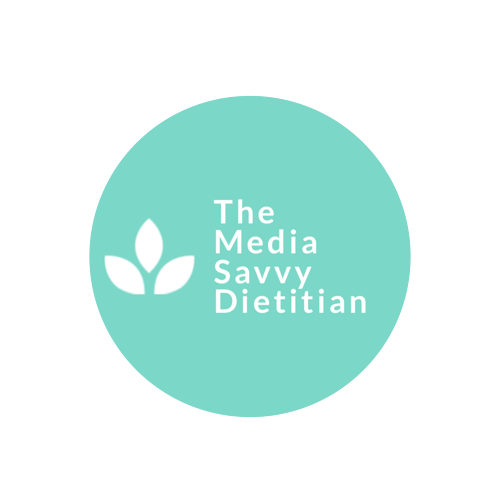10 tips to help get you started in the media
Are you a registered dietitian or qualified nutritionist who is fed up with seeing unqualified people talking about nutrition on the TV or in your favourite magazine?
Now is YOUR chance to take action and to become the one that journalists and the media turn to when they have a nutrition question. But how do you get started? Here are my top 10 tips to help YOU get started in the media. While it can be a daunting task, believe in yourself - you know more about nutrition than the vast majority!
How do I get started in media ?
1. Have confidence
Take a deep breath and remind yourself that as a dietitian or degree-qualified nutritionist YOU’RE MORE THAN QUALIFIED TO SPEAK ABOUT NUTRITION. If you don’t give it a go, someone with lesser qualifications will. Back yourself. You've got this! Your education is your strength.
2. Be a part of the conversation
Get involved on social media, call journalists or write ‘letters to the editor’ if you notice something is incorrect or if would like to further discuss the issue from a different angle. Speak up when you notice something is not accurate or evidence-based - point out the errors in research, cite studies that show otherwise, refer to the weight of scientific evidence and let people know that n=1 testimonials do not make robust science, but always maintain your professionalism and be respectful of others at all times. By not speaking up or correcting inaccuracies, we are letting the misinformation win!
3 . Become your own publicist or seek the guidance of an agent
It can be tough trying to get noticed in the first place. Sending out a media kit outlining who you are, your field of expertise and what you can offer, can help to get you noticed by key media. Think about which TV stations, publications, blogs, companies or brands you want to align with and start there. Remember many journalists, newsrooms and companies get inundated with emails, so try to think outside the box and get creative. It all helps to get YOU noticed!
If you're struggling with doing this yourself, engage the services of an agent or publicist who specialises in managing 'media personalities'. Agents will have a vast number of connections that they will be able to leverage to help you get a foot in the door.
4. Make it personal
While media kits can be helpful for targeting a large number of key media, you can't beat having a personal connection with a media contact. Offer to take a journalist out for a coffee to discuss the latest nutrition issues and to find out more about what nutrition information they are after. Use this as an opportunity to really sell yourself and what benefits you can offer them too.
5. Don't be afraid to use your connections
Do you have a friend or family member in media or know someone with a tonne of followers on social media? Ask them if there are any opportunities where you could collaborate. Also remember to do your best to support the profession by sharing posts or blogs written by other nutrition professionals. You never know, they may just return the favour, helping to gain you more followers and exposure too....as well as expanding the reach of those all important evidence-based messages!
6. Try, try and try again
Sometimes it can feel like no one is listening or taking notice of all your pitches, emails, social media comments or any of the nutrition noise that you are making. While it can be hard to not feel discouraged, like with anything, perseverance is key. Media is a fickle industry and the turnover of editors, producers and journalists is often high. To ensure that you are noticed, and continue to be noticed, keep making noise and reaching out to ensure you are not forgotten.
7. Offer to write articles/blogs and pitch ideas to your favourite publications or blogs/websites
Publications and blogs are always looking for fresh content, so use this to your advantage. If you would like to try your hand at writing, offer to write some articles or blogs. Either ask if there are any topics they would like you to cover, or try pitching your own ideas.
While as qualified nutrition professionals we should always put a dollar value on our time, writing for free (or at a reduced rate) or in lieu of advertising your services, can be a good way to get exposure initially. It is not for everyone, because lets be honest time really does equal money, but it can be a helpful way to develop a writing portfolio when you are starting out and to hone your writing skills. This can help to gain you some excellent exposure which can in turn lead on to paid opportunities.
8. If you're involved in something newsworthy or an upcoming event, let key media know
Now is not the time to be shy. If you have been involved in something newsworthy, whether it be a study you were involved in has been published, an initiative you have been working on has launched or if you have new resources or a book/seminar to promote, now is the time to do it. Send out a mini 'press release' to any media (or business) contacts you have, informing them of the what, who, when, where and how. You may be surprised at who picks up the story - many local and community news outlets are often keen to showcase what is going on in the community.
9. Become your own journalist
Use social media to your advantage and become your own journalist. Unlike mainstream media, where your videos or writing can be heavily edited, you can use your blog or social media platforms to get out your own unedited views to the masses. Do a course in SEO to help you ensure your blogs get found & rank highly on Google, and schedule social media posts to ensure you get the best reach and that you've always got regular content.
If you don't have time to create your own content, share the posts and blogs of other nutrition professionals, or simply 'like' or comment so that their messages are heard. The more noise we can create ourselves and support we can give to each other the better. We all need to harness the power of social media and the internet, because lets be honest the unqualified pseudo-nutritionists out there are doing exactly that.....and often doing it well.
10. Say "YES"
Become a "yes" girl (or boy)! Make responding to media queries a priority. Say "yes" to every opportunity that comes your way, or as timing allows. For the most part I have found media to be relatively accommodating with deadlines, with the exception of reactive 'news'-type interviews, which often have to be done ASAP! If you are unavailable or unable to make a deadline, make sure you refer the journalist on to a number of other media savvy nutrition professionals so that you don't leave them hanging. The chances are that even if you haven't been able to respond to this query, that they will contact you again in future.
REMEMBER YOU’RE MORE THAN QUALIFIED TO SPEAK ABOUT NUTRITION.
If you don’t give it a go, someone with lesser qualifications will.

